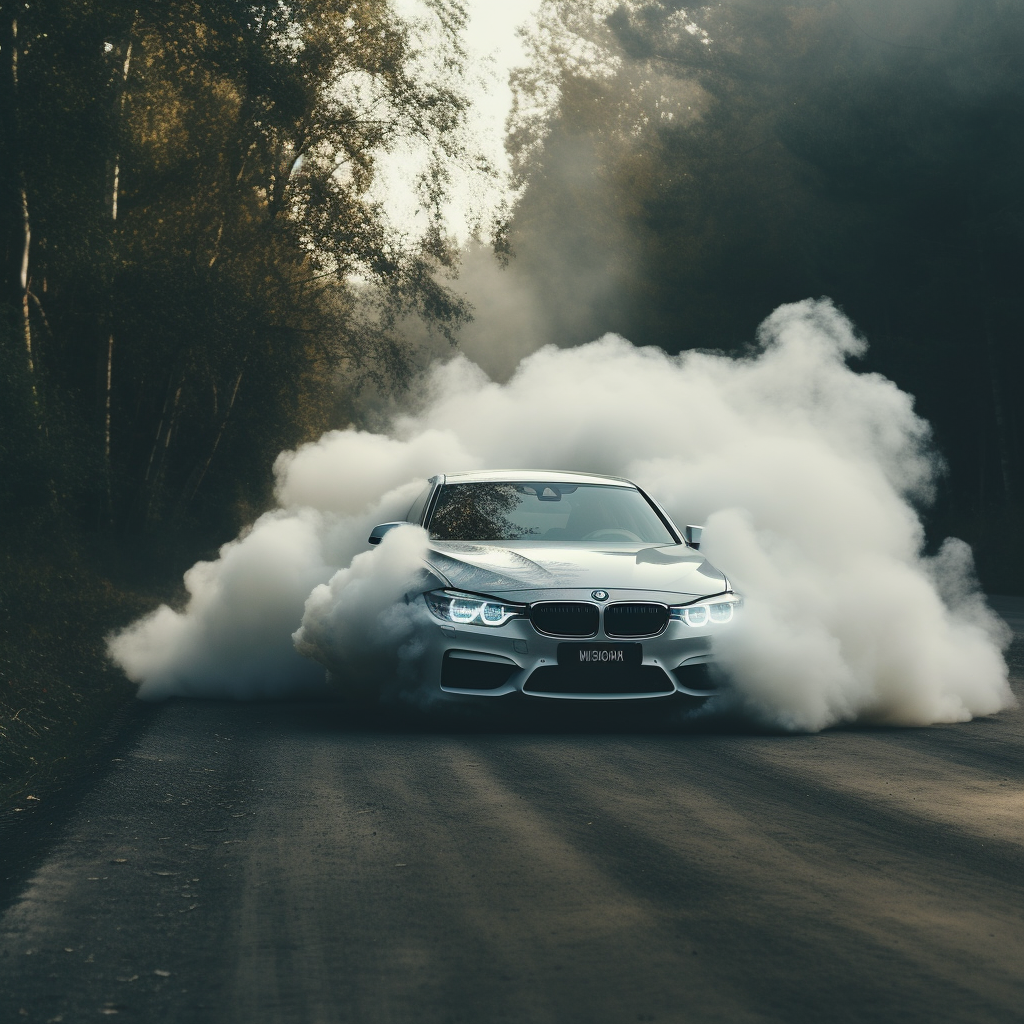Why does my BMW smoke when I start it? This is a problem that can make any car owner’s heart sink.
This is not a totally uncommon problem to have, especially on higher mileage vehicles and particularly during the warm summer months.
This isn’t just an annoyance though – smoke coming out of the exhaust or engine bay is a sign of an underlying problem, not necessarily serious, but certainly not an issue to be ignored. From oil burning to coolant leaks, the potential causes are quite diverse.
The good news? Understanding why your BMW smokes when you start it can lead to solutions that will keep your ride running smoothly for years to come.
Understanding the Causes of Smoke from a BMW Engine

Seeing smoke billowing out of your BMW’s engine can be quite disconcerting, but understanding its root causes will help you address it more effectively. Here are some key reasons why your BMW might be smoking.
Burning Oil: Grey Smoke Emanating From the Exhaust
If grayish smoke is puffing out of the exhaust, it could be due to oil burning in the engine. This typically happens when worn-out valve seals or piston rings allow oil into the combustion chamber where it burns alongside fuel.
Worn out piston rings or valve seals are incredibly uncommon on lower mileage vehicles but these issues start appearing on cars after the 100,000 mile marker.
The crucial role of piston rings involves maintaining compression within cylinders while keeping oil away from combustion processes. When they wear out, oil leaks into the head of the engine and you will notice an increased consumption of oil as well as grey smoke coming out of the exhaust.
Coolant Leaks: The White Smoke Culprit
White smoke emanating from the exhaust usually signifies coolant leaking into the engine head. Such leaks, commonly caused by faulty head gaskets, can lead to overheating problems and serious damage if not addressed promptly.
Unfortunately, leaky head gaskets are not an entirely uncommon phenomenon on BMWs as BMW has traditionally employed a very thin head gasket mounted on top of an aluminum head. I have personally had to replace head gaskets on two of my older 3 Series BMWs.
Damaged Electrical Wiring: A Dark Cloud Looms
Damaged electrical wiring may result in short circuits that emit black smoke along with other symptoms like erratic dashboard readings and frequently blown fuses. YourMechanic offers an extensive guide on diagnosing faulty wiring harnesses, which will help nip any potential hazards in their infancy stages.
Damaged electrical wiring is not nearly as common a problem as the previously mentioned issues but keep in mind that electrical wiring issues are more likely to occur after vehicular collisions or flooding.
Diagnosing Grey BMW Engine Smoke

So now we’ve uncovered what might cause those ominous clouds emanating from under your hood. But how do we pinpoint exactly what’s going wrong? That brings us here, let’s dive deep into accurate diagnosis techniques for identifying grey smoking.
Evaluating Oil Level and Quality
The first step to take if your engine is billowing out grey smoke is to check the oil levels. Too much or too little oil could lead to issues like burn-off during ignition, which will result in visible smoke.
Besides the level, also consider the quality of your car’s oil. Long overdue changes will result in darkened or thickened motor oil that can contribute significantly to producing nasty exhaust fumes on startup.
Performing A Compression Test
A compression test helps determine whether worn piston rings or valve seals are causing excessive blow-by. The point of a compression test is to identify the compression (measured in psi) within each cylinder of the engine.
If you notice that one or more of the cylinders are indicating a psi that is below BMW’s specifications, it’s time to either (i) take the vehicle to the shop to perform additional diagnosis and potentially tell you that your seals are gone or (ii) perform a leak-down test in order to identify exactly where you are getting a compression leak.
Here is a great video below on using a compression tester.
What if Grey Smoke Is Coming from the Engine Bay?
Thus far, we have only discussed grey smoke within the context of it emanating from the tailpipe. But if your BMW is instead suffering from grey smoke emanating from the engine bay then you are likely dealing with an entirely different issue.
Instead of an internal engine leak such as a piston ring or valve seal, the most common cause of grey smoke in the engine bay is a bad valve cover gasket. This is not the only potential cause, but it is by FAR the most common.
Luckily, valve cover gaskets are incredibly simple to replace (except on V8 BMWs, sorry) and inexpensive. Do not procrastinate fixing a valve cover gasket as burning oil in the engine bay is a serious fire hazard.
Diagnosing Coolant Leaks in a BMW Engine

Is your BMW emanating white smoke that smells a little bit sugary/sweet? You know you have a coolant leak then but what exactly is causing the smoke? The issue could be due to faulty hoses or gaskets, cracked cylinder heads or blocks, or a damaged water pump.
White Smoke Emanating from the Exhaust
As discussed above, white smoke emanating from the tailpipe is a strong indication that you have a worn-out head gasket. A simple way to test this is by doing a combustion leak test with a $30 tool you can pick up at your local auto parts store.
We have a detailed write-up here on using a combustion leak tester. It is a relatively simple test, and the purpose is to identify whether exhaust fumes are seeping into your coolant. If the test comes up positive, you can be pretty sure that your vehicle will need AT LEAST a head gasket.
What if White Smoke is Emanating From the Engine Bay?
White smoke emanating from the exhaust is a solid indicator that you are dealing with a blown head gasket but if, on the otherhand, you have white smoke emanating from the engine bay, then you are dealing with a different problem.
***Please keep in mind to only attempt to diagnose coolant leak issues when the engine is cold. Engine coolant is highly pressurized, and it gets extremely hot!!!!****
Worn Out Hoses or Gaskets
Coolant leaks can often be traced back to worn-out hoses or gaskets. These components act like seals for various engine parts, but they’re prone to deterioration over time. If your leak is near the engine, then chances are the coolant is leaking onto the side of the engine and the heat is causing it to evaporate.
Damaged Water Pumps

Another common cause is a worn-out water pump or radiator. Both parts tend to dump coolant in a dramatic fashion when they fail so identification should be as simple as popping open the hood and taking a look around.
Preventing Smoke from Reoccurring in Your BMW Engine
Here are some maintenance tips to keep in mind that will help keep your BMW in excellent condition over the long haul. At the end of the day, an ounce of prevention is worth a pound of cure, and we can all agree that we would rather prevent our BMWs from smoking in the first place.
The Right Motor Oil Matters

Picking the right motor oil viscosity for your specific model can make a major difference. If it’s too thin, small amounts may pass through clearances between moving parts within your engine, causing smoke during ignition.
Blauparts has a great write-up on the proper oil viscosity for different BMWs but your local BMW dealership will always be there to confirm (hopefully they won’t charge you for this information 😉).
Regular Oil Changes: The Heartbeat of Your Engine
Always follow your maintenance schedule for oil changes. Regular oil changes are incredibly important for the life of your engine. Oil breaks down over time and overdue oil is less effective at preventing friction between the moving parts in your engine. In addition, engine oil also plays a key role in cooling down your engine.
Conclusion
Unraveling the mystery of why your BMW smokes when you start it can be a daunting task. We’ve explored potential causes, such as oil burning and coolant leaks. And we’ve dug into diagnosis techniques, from checking oil levels to inspecting for leaks and running compression tests.
You now understand how worn piston rings or valve seals might cause oil burning in your engine. Similarly, faulty hoses or gaskets could lead to coolant leaks in your beloved Beamer. We’ve also discussed ways to repair these issues, like replacing worn piston rings or fixing coolant leaks.
Above all else though, remember that prevention is key – regular maintenance can save you headaches down the line!
Don’t be intimidated! A Better BMW is here to help guide you through every step of owning and maintaining your vehicle. We offer detailed guides on repairs as well as comprehensive reviews and buyer’s guides for prospective owners. Click here to dive deeper into the world of BMWs with us at A Better BMW!
Frequently Asked Questions (FAQ)
1. What color smoke should I be concerned about?
Different colors of smoke signify different issues. Grayish smoke typically indicates burning oil, while white smoke could mean a coolant leak. Black smoke often points to electrical issues.
2. Is it normal for an older BMW to smoke?
While it’s more common for older vehicles with higher mileage to experience some smoke, it should not be ignored. Smoke is generally a sign of underlying issues that should be addressed immediately.
3. How much will it cost to fix my smoking BMW?
The cost of repairs varies significantly depending on the issue. For example, replacing worn piston rings can be expensive, while a new valve cover gasket may be more affordable. It’s best to consult with a mechanic for an accurate estimate.
4. Can I still drive my BMW if it’s smoking?
It’s not advisable to continue driving a smoking vehicle. Doing so could exacerbate the problem and lead to more severe damage.
5. What’s the first thing I should do if my BMW starts to smoke?
Firstly, pull over in a safe location and turn off the engine. Assess the color and location of the smoke to get a preliminary idea of the issue. For a more accurate diagnosis, consult a qualified mechanic.
6. How often should I check my oil and coolant levels?
Frequent checks are crucial, especially if you’ve noticed smoke. For peace of mind, inspect oil and coolant levels every two weeks or before long journeys.
7. What role does the head gasket play in my BMW smoking?
The head gasket serves as a seal between the engine block and the cylinder head. A faulty head gasket can allow coolant to leak into the combustion chamber, resulting in white smoke.
8. Where can I find more resources on maintaining my BMW?
Our website, A Better BMW, offers extensive guides and tutorials on everything you need to know about BMW maintenance and repair.
